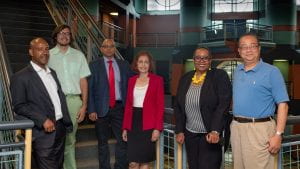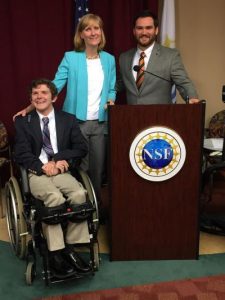Strengthening Training and Resources for Inclusion in Data Engineering and Sciences (AGEP STRIDES)
National Science Foundation
AGEP (Award No. 1916093)
The AGEP DES Alliance Model was created in response to the NSF’s Alliances for Graduate Education and the Professoriate (AGEP) program solicitation (NSF 16-552). The AGEP program seeks to advance knowledge about models to improve pathways to the professoriate and success of URM graduate students, postdoctoral fellows and faculty in specific STEM disciplines and/or STEM education research fields. AGEP Alliances develop, replicate or reproduce, implement, and study, via integrated educational and social science research, AGEP Alliance Models to transform the dissertation phase of doctoral education, postdoctoral training and/or faculty advancement, and transitions within and across the pathway levels, of URMs in STEM and/or STEM education research careers. This collaborative research project brings together Rice University, Texas Southern University and the University of Houston, with the goal to develop, implement, study, evaluate, disseminate, sustain and potentially reproduce an AGEP Alliance Model to support and advance historically underrepresented minority (URM) STEM doctoral candidates and postdoctoral researchers into faculty positions in data engineering and science (DES) fields. The project employs a three-pronged approach: Professional development opportunities for faculty advisors and mentors; activities to address equity issues in institutional policies and procedures; and training for URM graduate students and postdoctoral researchers in key knowledge and skill areas that are essential to DES faculty member success: research, teaching, entrepreneurship, leadership and administration.
Read the full abstract here. Click here for the project website.
Solving Problems of Mathematics Accessibility Using Process-Driven Math
National Science Foundation
IUSE:EHR (Award No. 1726524)
Researchers at Rice University are partnering with investigators at Auburn University at Montgomery (AUM) who have developed an innovative, evidence-based method of math instruction and assessment called Process-Driven Math (PDM), which has the potential to revolutionize mathematics education by significantly reducing barriers for students who are blind or visually impaired (BVI) and those who have other print disabilities. The PDM method is based on an interactive auditory/verbal exchange of language between the student and a human intermediary who functions as both reader and scribe. The method was translated into a visual format to provide sighted learners with the benefit of a reduction in visual syntax. This research will focus specifically on algebra courses at both the secondary and post-secondary levels. It will be conducted at three state schools for the blind and four institutions of higher education, including one two-year college, and will include a workshop to train instructors on PDM and on some of the fundamentals of teaching diverse learners. It is expected that PDM will improve access to mathematics for many students, particularly those with disabilities, and broaden their participation in math and other STEM disciplines. In the longer term, this will help keep students in the STEM pipeline and ultimately increase the number and diversity of students who can become members of our Nation’s STEM-ready workforce. Successful completion of this project will provide a springboard for creating resources to scale PDM to larger numbers of students across multiple institutions and to higher level mathematics courses.
Read the full abstract here. Click here to visit the project website.
Capacity Building for Competitive S-STEM Proposals
National Science Foundation
S-STEM (Award No. 1703829)
Rice University will host two two-day workshops titled “Capacity Building for Competitive S-STEM Proposals” with the broad goal of improving the competitiveness of submissions to the National Science Foundation Scholarships in Science, Technology, Engineering and Mathematics (NSF S-STEM) program from predominantly undergraduate institutions (PUIs), with emphasis on those located in states and jurisdictions that are part of the Experimental Program to Stimulate Competitive Research (EPSCoR) program. PUIs include associate’s colleges, baccalaureate colleges, and master’s colleges, as well as doctoral institutions that award a limited number of terminal degrees in STEM disciplines supported by NSF. EPSCoR was established by NSF in 1978 to “stimulate competitive research in regions of the country that were less able to compete successfully for research funds.” Building on the team member requirements in the S-STEM solicitation, participants will apply to and participate in the workshop in pairs – principal investigators (PIs) and researchers (educational, social/behavioral, discipline-based educational, or institutional). Potential broader impacts include improved (1) geographical diversity of S-STEM awards; (2) institutional diversity among S-STEM awardees; and (3) industry and academia partnerships, including partnerships among public and private as well as teaching and research institutions.
Read the full abstract here. Click here to visit the project website.


